英文名著阅读翻译:The Blossom 花儿
双语安徒生童话《玫瑰花精TheElfoftheRose》

双语安徒生童话《玫瑰花精TheElfoftheRose》IN the midst of a garden grew a rose-tree, in full blossom, and in the prettiest of all the roses lived an elf. He was such a little wee thing, that no human eye could see him. Behind each leaf of the rose he had a sleeping chamber.He was as well formed and as beautiful as a little child could be, and had wings that reached from his shoulders to his feet. Oh, what sweet fragrance there was in his chambers! and how clean and beautiful were the walls! for they were the blushing leaves of the rose.During the whole day he enjoyed himself in the warm sunshine, flew from flower to flower, and danced on the wings of the flying butterflies. Then he took it into his head to measure how many steps he would have to go through the roads and cross-roads that are on the leaf of a linden-tree. What we call the veins on a leaf, he took for roads; aye, and very long roads they were for him; for before he had half finished his task, the sun went down: he had commenced his work too late. It became very cold, the dew fell, and the wind blew; so he thought the best thing he could do would be to return home. He hurried himself as much as he could; but he found the roses all closed up, and he could not get in; not a single rose stood open.The poor little elf was very much frightened. He had never before been out at night, but had always slumbered secretly behind the warm rose-leaves. Oh, this would certainly be his death. At the other end of the garden, he knew there was an arbor, overgrown with beautiful honey-suckles. The blossoms looked like large painted horns; and he thought to himself, he would go and sleep in one of these till the morning. He flew thither; but"hush!" two people were in the arbor,- a handsome young man and a beautiful lady. They sat side by side, and wished that they might never be obliged to part. They loved each other much more than the best child can love its father and mother."But we must part," said the young man; "your brother does not like our engagement, and therefore he sends me so far away on business, over mountains and seas. Farewell, my sweet bride; for so you are to me."And then they kissed each other, and the girl wept, and gave him a rose; but before she did so, she pressed a kiss upon it so fervently that the flower opened. Then the little elf flew in, and leaned his head on the delicate, fragrant walls. Here he could plainly hear them say, "Farewell, farewell;" and he felt that the rose had been placed on the young man's breast. Oh, how his heart did beat! The little elf could not go to sleep, it thumped so loudly. The young man took it out as he walked through the dark wood alone, and kissed the flower so often and so violently, that the little elf was almost crushed. He could feel through the leaf how hot the lips of the young man were, and the rose had opened, as if from the heat of the noonday sun.There came another man, who looked gloomy and wicked. He was the wicked brother of the beautiful maiden. He drew out a sharp knife, and while the other was kissing the rose, the wicked man stabbed him to death; then he cut off his head, and buried it with the body in the soft earth under the linden-tree."Now he is gone, and will soon be forgotten," thought the wicked brother; "he will never come back again. He was going on a long journey over mountains and seas; it is easy for a man to lose his life in such a journey. My sister will suppose he is dead; for he cannot come back, and she will not dare to question meabout him."Then he scattered the dry leaves over the light earth with his foot, and went home through the darkness; but he went not alone, as he thought,- the little elf accompanied him. He sat in a dry rolled-up linden-leaf, which had fallen from the tree on to the wicked man's head, as he was digging the grave. The hat was on the head now, which made it very dark, and the little elf shuddered with fright and indignation at the wicked deed.It was the dawn of morning before the wicked man reached home; he took off his hat, and went into his sister's room. There lay the beautiful, blooming girl, dreaming of himwhom she loved so, and who was now, she supposed, travelling far away over mountain and sea. Her wicked brotherstopped over her, and laughed hideously, as fiends only can laugh.The dry leaf fell out of his hair upon the counterpane; but he did not notice it, and went to get a little sleep during the early morning hours. But the elf slipped out of the withered leaf, placed himself by the ear of the sleeping girl, and told her, as in a dream, of the horrid murder; described the place where her brother had slain her lover, and buried his body; and told her of the linden-tree, in full blossom, that stood close by."That you may not think this is only a dream that I have told you," he said, "you will find on your bed a withered leaf."Then she awoke, and found it there. Oh, what bitter tears she shed! and she could not open her heart to any one for relief.The window stood open the whole day, and the little elf could easily have reached the roses, or any of the flowers; but he could not find it in his heart to leave one so afflicted. In the window stood a bush bearing monthly roses. He seated himself in one of the flowers, and gazed on the poor girl. Her brotheroften came into the room, and would be quite cheerful, in spite of his base conduct; so she dare not say a word to him of her heart's grief.As soon as night came on, she slipped out of the house, and went into the wood, to the spot where the linden-tree stood; and after removing the leaves from the earth, she turned it up, and there found him who had been murdered. Oh, how she wept and prayed that she also might die! Gladly would she have taken the body home with her; but that was impossible; so she took up the poor head with the closed eyes, kissed the cold lips, and shook the mould out of the beautiful hair.。
高中英语 Song of the Burial of Flowers葬花吟阅读素材

Song of the Buria of Fower葬花吟Fower fade and fa and f about u in the ,But who itie the o of our fragrance when ou die?花谢花飞飞满天,红绡香断有谁怜?Lie goamer ou foat and and on boudoir I igh over the coe of orrowfu feeing 闺中女儿惜春暮,愁绪满怀无处诉。
S under m fine curtain,To and fro on faen eta, how can I bear treading?手把花锄出绣帘,忍踏落花来复去。
Wiow twig and em bud end weet cent a the ma,Who care when eta are in deca?柳丝榆荚自芳菲,不管桃飘与李飞。
Net ear tree wi be in boom again,But who wi be the mater of m boudoir then?桃李明年能再发,明岁闺中知是谁In March unar waow have got their net read,The on the beam eem to be thoe without merc三月香巢初垒成,梁间燕子太无情!Net ear in their fight, freh fower the ma e ient and go without eaving a trace 怜春忽至恼忽去,至又无语去不闻。
Lat night beond ed riing,Wa it the ou of fower or bird that were inging?昨宵庭外悲歌奏,知是花魂与鸟魂It i awa hard to a their ou to ta behind,That bird are ient and fower fee ahamed, I find花魂鸟魂总难留,鸟自无语花自羞。
长寿花的花骨朵英语作文
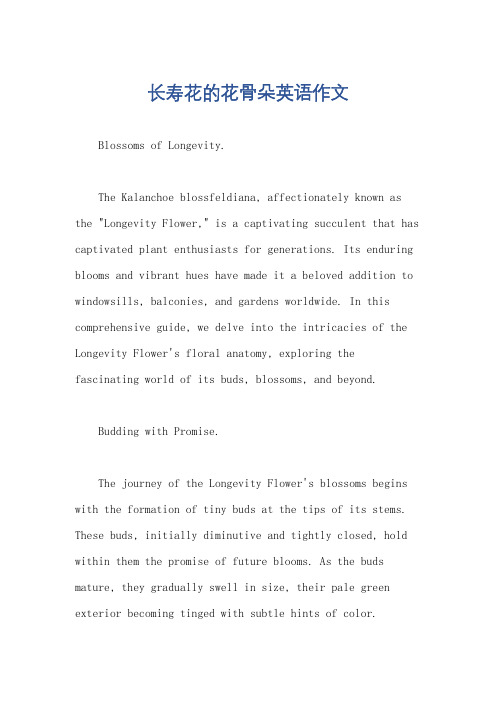
长寿花的花骨朵英语作文Blossoms of Longevity.The Kalanchoe blossfeldiana, affectionately known as the "Longevity Flower," is a captivating succulent that has captivated plant enthusiasts for generations. Its enduring blooms and vibrant hues have made it a beloved addition to windowsills, balconies, and gardens worldwide. In this comprehensive guide, we delve into the intricacies of the Longevity Flower's floral anatomy, exploring thefascinating world of its buds, blossoms, and beyond.Budding with Promise.The journey of the Longevity Flower's blossoms begins with the formation of tiny buds at the tips of its stems. These buds, initially diminutive and tightly closed, hold within them the promise of future blooms. As the buds mature, they gradually swell in size, their pale green exterior becoming tinged with subtle hints of color.Within the confines of each bud, a complex interplay of cellular activity unfolds. Cells divide and differentiate, giving rise to the various components of the flower. Petals, sepals, stamens, and pistils emerge from the primordial chaos, each playing a vital role in the flower's reproductive cycle.Unveiling the Blossom.As the bud reaches its peak of development, a delicate transformation begins. The outer sepals, which hadpreviously enveloped the bud, slowly unfurl, revealing the pristine beauty within. The petals, once tightly furled,now gracefully extend outward, flaunting their vibrant hues.The Longevity Flower's blossoms come in a kaleidoscopeof colors, ranging from classic shades of red and pink to more exotic hues of orange, yellow, purple, and white. Some varieties even boast captivating bicolors or intricate patterns, adding to their visual appeal.The flower's central structure, known as the androecium, is composed of numerous stamens. Each stamen consists of a slender filament topped by an anther, which produces and releases pollen. The pollen grains, carried by the wind or insects, are essential for the flower's fertilization and subsequent seed production.At the heart of the Longevity Flower blossoms, thepistil or gynoecium presides. The pistil consists of a stigma, style, and ovary. The stigma, a receptive surface, receives pollen grains from the anthers. The pollen then germinates and produces pollen tubes, which grow down the style towards the ovary.The ovary, a swollen structure at the base of thepistil, contains one or more ovules. Should fertilization occur, the ovules develop into seeds, ensuring the continuation of the plant's lineage.Post-Bloom and Beyond.After the Longevity Flower has graced us with itsvibrant blooms, the withered blossoms gradually give way to seed pods. These pods, filled with countless miniature seeds, split open once they mature, dispersing the seeds to the surrounding environment.Some Longevity Flower varieties, particularly those propagated from vegetative cuttings, may exhibit the phenomenon of "continuous blooming." These perpetual bloomers produce flowers throughout the year, providing a continuous source of vibrant color and aesthetic delight.Cultural Significance.In many cultures, the Longevity Flower is revered for its symbolic meaning. Its protracted blooms are seen as a representation of longevity, prosperity, and good fortune. In certain regions, the Longevity Flower is gifted to loved ones as a token of well wishes and a long and healthy life.Moreover, the Longevity Flower has found widespread use in horticulture and landscaping. Its compact size and extended blooming period make it an ideal choice forcontainers, hanging baskets, and beds and borders. Theflower's hardiness and adaptability to various climatesalso contribute to its popularity among gardeners.Conclusion.The Longevity Flower, with its captivating blossoms, enduring blooms, and cultural significance, has capturedthe hearts of plant enthusiasts for centuries. From the formation of tiny buds to the unveiling of vibrant blossoms, each stage of the flower's life cycle is a testament to the intricate wonders of the natural world. As we delve intothe world of the Longevity Flower, we gain a deeper appreciation for the beauty, resilience, and symbolism that this remarkable plant embodies.。
[图文]花之歌英汉
![[图文]花之歌英汉](https://img.taocdn.com/s3/m/2e13efc35901020206409cb7.png)
[图文]花之歌英汉Song of the Flower花之歌Kahlil Gibran卡里纪伯伦Iamakindwordutteredandrepeated BythevoiceofNature; Iamastarfallenfromthe Bluetentuponthegreencarpet.我是亲切的言词,发自自然的心声,反复述说着絮语。
我是陨落的星辰,来自蓝色的苍穹,掉在绿色地毯里。
Iamthedaughteroftheelements WithwhomWinterconceived; TowhomSpringgavebirth;Iwas RearedinthelapofSummerandI SleptinthebedofAutumn. 众多元素是双亲,我是它们的爱女。
冬天腹中孕育我;春天赋予我生命,夏天膝上喂养我,秋天床上我栖息。
AtdawnIunitewiththebreezeToannouncethecomingoflight; AteventideIjointhebirds Inbiddingthelightfarewell. 黎明我与风一起,宣告光明已来临;傍晚我与鸟一起,宣布与光已分离。
The plain aredecoratedwith My beautiful colors,andtheair Is scented withmyfragrance. 因我缤纷的色彩,原野妆饰更美丽。
因我馥郁的气味,空气弥漫馨香气。
AsIembraceSlumbertheeyesof Nightwatchoverme,andasI AwakenIstareatthesun,whichis Theonlyeyeoftheday.当我拥抱睡眠时,我在黑夜双眼里;当我醒着的时候,太阳就在我眼里。
白昼唯有一只眼,太阳原本是唯一。
Idrinkdewforwine,andhearkento Thevoicesofthebirds,anddance Totherhythmicswayingofthegrass. 我饮露酿的美酒,倾听鸟儿的鸣啼。
关于花儿的诗英文
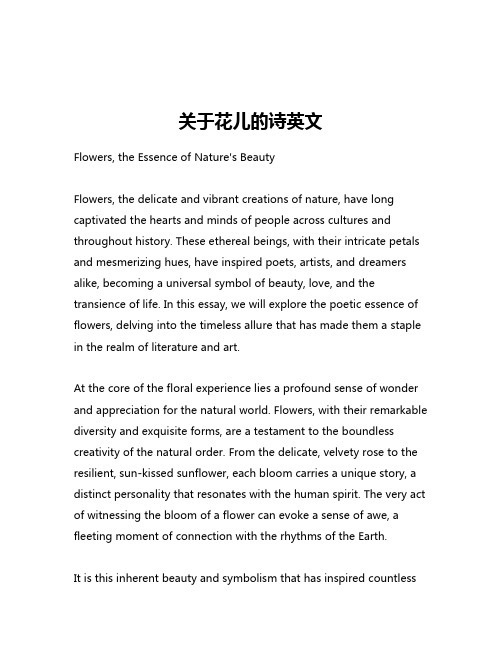
关于花儿的诗英文Flowers, the Essence of Nature's BeautyFlowers, the delicate and vibrant creations of nature, have long captivated the hearts and minds of people across cultures and throughout history. These ethereal beings, with their intricate petals and mesmerizing hues, have inspired poets, artists, and dreamers alike, becoming a universal symbol of beauty, love, and the transience of life. In this essay, we will explore the poetic essence of flowers, delving into the timeless allure that has made them a staple in the realm of literature and art.At the core of the floral experience lies a profound sense of wonder and appreciation for the natural world. Flowers, with their remarkable diversity and exquisite forms, are a testament to the boundless creativity of the natural order. From the delicate, velvety rose to the resilient, sun-kissed sunflower, each bloom carries a unique story, a distinct personality that resonates with the human spirit. The very act of witnessing the bloom of a flower can evoke a sense of awe, a fleeting moment of connection with the rhythms of the Earth.It is this inherent beauty and symbolism that has inspired countlesspoets to immortalize the essence of flowers in their timeless verses. The English language, in particular, has a rich tradition of floral-inspired poetry, where the written word becomes a canvas for the artist's vision. Whether it is the Romantic musings of William Wordsworth, who found solace in the "golden daffodils" that "flit the breeze," or the intricate imagery of John Keats, who likened the rose to a "sweet tomb" of love, the language of flowers has been a well-spring of poetic inspiration.Beyond the purely aesthetic appeal, flowers have also served as powerful metaphors, embodying the human experience in all its complexities. The delicate and ephemeral nature of flowers has often been juxtaposed with the fragility of life, the transience of love, and the resilience of the human spirit. The blossom, in all its glory, becomes a symbol of the cycle of birth, growth, and decay, mirroring the universal journey of existence.One particularly poignant example of this metaphorical richness can be found in the work of Emily Dickinson, the iconic American poet. In her poem "Because I Could Not Stop for Death," Dickinson personifies death as a gentle suitor, who "kindly stopped" to take her on a journey of the afterlife. As they pass the fields of grain and the setting sun, Dickinson catches a glimpse of a "Head, like a Czar" – a reference to a flower, perhaps a poppy or a rose, that serves as a haunting reminder of the impermanence of earthly existence.The power of floral imagery extends beyond the written word, infiltrating the realms of visual art as well. Painters, from the Impressionist masters to the abstract expressionists, have long been captivated by the chromatic splendor and ethereal qualities of flowers. Claude Monet's "Water Lilies" series, for instance, is a testament to the artist's obsession with capturing the fleeting beauty of these aquatic blooms, their reflections dancing on the surface of the water like ethereal spirits.Indeed, the universal appeal of flowers in art and literature is a testament to their profound significance in the human experience. These vibrant, living manifestations of nature's artistry have the power to evoke emotion, spark imagination, and connect us to the deeper rhythms of the world around us. Whether it is the delicate, fragrant rose or the bold, sun-drenched sunflower, the flower remains a timeless symbol of the beauty, fragility, and resilience that define the human condition.In conclusion, the poetic essence of flowers is a testament to the enduring power of the natural world to inspire and captivate the human spirit. Through the medium of language and art, poets and artists have sought to capture the fleeting beauty and profound symbolism of these botanical wonders, weaving them into the tapestry of our shared cultural heritage. As we continue to marvel atthe enchanting blooms that grace our world, may we find solace in the knowledge that the language of flowers will forever echo through the annals of human creativity and expression.。
blossom的用法
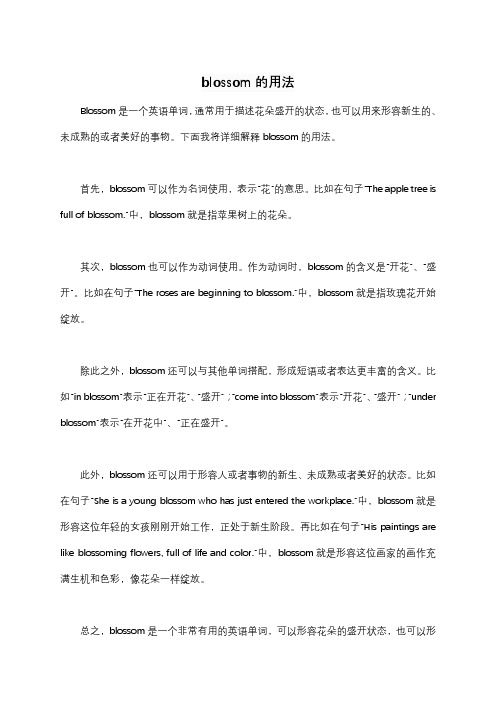
blossom的用法Blossom是一个英语单词,通常用于描述花朵盛开的状态,也可以用来形容新生的、未成熟的或者美好的事物。
下面我将详细解释blossom的用法。
首先,blossom可以作为名词使用,表示“花”的意思。
比如在句子“The apple tree is full of blossom.”中,blossom就是指苹果树上的花朵。
其次,blossom也可以作为动词使用。
作为动词时,blossom的含义是“开花”、“盛开”。
比如在句子“The roses are beginning to blossom.”中,blossom就是指玫瑰花开始绽放。
除此之外,blossom还可以与其他单词搭配,形成短语或者表达更丰富的含义。
比如“in blossom”表示“正在开花”、“盛开”;“come into blossom”表示“开花”、“盛开”;“under blossom”表示“在开花中”、“正在盛开”。
此外,blossom还可以用于形容人或者事物的新生、未成熟或者美好的状态。
比如在句子“She is a young blossom who has just entered the workplace.”中,blossom就是形容这位年轻的女孩刚刚开始工作,正处于新生阶段。
再比如在句子“His paintings are like blossoming flowers, full of life and color.”中,blossom就是形容这位画家的画作充满生机和色彩,像花朵一样绽放。
总之,blossom是一个非常有用的英语单词,可以形容花朵的盛开状态,也可以形容人或者事物的新生、未成熟或者美好的状态。
通过灵活运用blossom的用法,我们可以更好地表达自己的想法和感受。
名著书名英译 文档
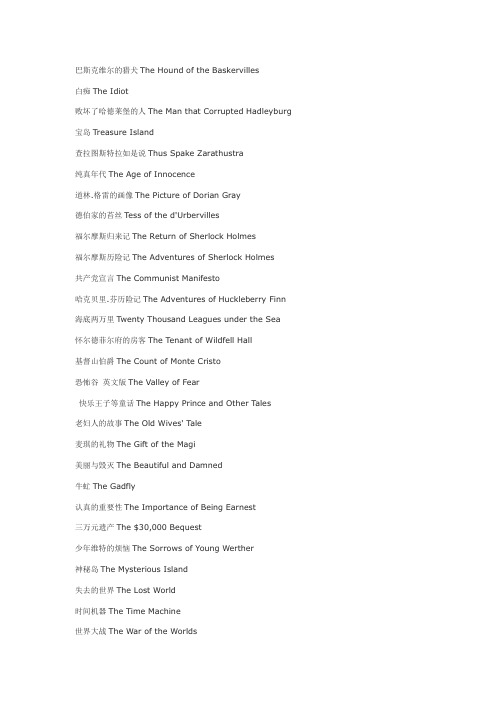
巴斯克维尔的猎犬The Hound of the Baskervilles白痴The Idiot败坏了哈德莱堡的人The Man that Corrupted Hadleyburg 宝岛Treasure Island查拉图斯特拉如是说Thus Spake Zarathustra纯真年代The Age of Innocence道林.格雷的画像The Picture of Dorian Gray德伯家的苔丝Tess of the d'Urbervilles福尔摩斯归来记The Return of Sherlock Holmes福尔摩斯历险记The Adventures of Sherlock Holmes共产党宣言The Communist Manifesto哈克贝里.芬历险记The Adventures of Huckleberry Finn 海底两万里Twenty Thousand Leagues under the Sea怀尔德菲尔府的房客The Tenant of Wildfell Hall基督山伯爵The Count of Monte Cristo恐怖谷英文版The Valley of Fear快乐王子等童话The Happy Prince and Other Tales老妇人的故事The Old Wives' Tale麦琪的礼物The Gift of the Magi美丽与毁灭The Beautiful and Damned牛虻The Gadfly认真的重要性The Importance of Being Earnest三万元遗产The $30,000 Bequest少年维特的烦恼The Sorrows of Young Werther神秘岛The Mysterious Island失去的世界The Lost World时间机器The Time Machine世界大战The War of the Worlds斯泰尔斯庄园奇案The Mysterious Affair at Styles 四签名The Sign of the Four太阳照常升起The Sun Also Rises汤姆.索亚历险记The Adventures of Tom Sawyer 野性的呼唤The Call of the Wild隐身人The Invisible Man名利场Vanity Fair呼啸山庄Wuthering Heights华盛顿广场Washington Square恋爱中的女人Women in Love瓦尔登湖Walden儿子与情人Sons and Lovers嘉利妹妹Sister Carrie理智与情感Sense and Sensibility复活Resurrection鲁宾逊飘流记Robinson Crusoe罗密欧与朱丽叶Romeo and Juliet劝导Persuasion惊魂记Quentin Durward百年孤独One Hundred Years of Solitude人性的枷锁Of Human Bondage物种起源On the Origin of Species雾都孤儿Oliver Twist傲慢与偏见Pride and Prejudice少奶奶的扇子Lady Windermere's Fan小妇人Little Women小男人Little Men白鲸记Moby Dick; or The Whale变形记Metamorphosis福尔摩斯回忆录Memoirs of Sherlock Holmes共产党宣言Manifest der Kommunistischen Partei 悲惨世界Les Misérables巴黎圣母院Notre Dame de ParisA Doll\'s House《玩偶之家》(亨里克·易卜生,挪威)A Farewell to Arms《别了,武器》(海明威,美国)A Midsummer Night\'s Dream《仲夏夜之梦》(莎士比亚,英国)A Tale of Two Cities(《双城记》(查尔斯·狄更斯,英国)A Thousand and One Nights《一千零一夜》Adam Bede《亚当·贝德》(乔治·艾略特,英国)All\'s Well That Ends Well《终成眷属》(莎士比亚,英国)Anna Karenina《安娜·卡列尼娜》(列夫·托尔斯泰,俄国)As You Like it《皆大欢喜》(莎士比亚,英国)Bel-Ami《漂亮朋友》(基·德·莫泊桑,法国)Canterbury Tales《坎特伯雷故事集》(杰弗里·乔叟,英国)Childe Harold\'s Pilgrimage《查尔德·哈罗德游记》(拜伦,英国)Crime and Punishment《罪与罚》(陀斯妥也夫斯基,俄国〕David Copperfield《大卫·科波菲尔》(查尔斯·狄更斯,英国)Don Juan《唐璜》(乔治·戈登·拜伦,英国)Elegy Written in a Country Churchyard《墓地衰歌》(托马斯·格雷,英国)Emma《爱玛》(简·奥斯汀,英国)Essays《培根论说文集》(弗郎西斯·培根,英国)Fairy Tales《安徒生童话》(安徒生,丹麦)For Whom the Bell Tolls《丧钟为谁而鸣》(海明威,美国)Gone with the Wind《乱世佳人》/《飘》Good Wives《好妻子》(露易莎·梅·奥尔科特,美国) Great Expectations《远大前程》(查尔斯·狄更斯,英国) Gulliver\'s Travels《格利佛游记》(乔纳森·斯威福特,英国) Hamlet《哈姆雷特》(莎士比亚,英国)Jane Eyre《简·爱》(夏洛特·勃朗特,英国)Jean-Christophe(《约翰·克利斯朵夫》(罗曼·罗兰,法国) King Lear《李尔王》(莎士比亚,英国)Lady Chatterlay\'s Lover《查太莱夫人的情人》(劳伦斯,英国)Les Miserables《悲惨世界》(雨果,法国)Little Women《小妇人》(露易莎·梅·奥尔科特,美国) Love of Life《热爱生命》(杰克.伦敦,美国) Mansfiela Park《曼斯菲尔德庄园》(简·奥斯汀,英国) Measure for Measure《自作自受》(莎士比亚,英国)Moby Dick《大白鲨》(赫尔曼·梅尔维尔,美国) Mrs. Warren\'s Profession《沃伦夫人的职业》(乔治·伯纳德·肖,英国) Much ado about Nothing《无事生非》(莎士比亚,英国)Nature《自然》(拉尔夫·沃尔多·爱默生,美国) Ode to a Nightingale《夜莺颂》(约翰·济慈,英国)Ode to the West Wind《西风颂》(雪莱,英国)Of Studies《论学习》(弗郎西斯·培根,英国) Oliver Twist《雾都孤儿》(查尔斯·狄更斯,英国) Othello《奥赛罗》(莎士比亚,英国)Paradise Lost《失乐园》(约翰·弥尔顿,英国) Persuasion《劝说》(简·奥斯汀,英国)Pride and Prejudice《傲慢与偏见》(简·奥斯汀,英国) Prometheus Unbound《被释的普罗米修斯》(雪莱,英国) Resurrection《复活》(列夫·托尔斯泰,俄国)Rob Roy《罗伯·罗伊》(沃尔特·斯科特,英国) Robinson Crusoe《鲁滨逊飘流记》(丹尼尔·笛福,英国) Romeo and Juliet《罗密欧与朱丽叶》(莎士比亚,英国)Sense and Sensibility《理智与情感》(简·奥斯汀,英国) Sister Carrie《嘉莉姐妹》(西奥多·德莱塞,美国) Tender is the Night《夜色温柔》(斯科特·菲茨杰拉德,美国) Tess of the D\'Urbervilles《德伯家的苔丝》(托马斯·哈代,英国) The Adventures of Tom Sawyer《汤姆.索亚历险记》(马克吐温,美国) The Beautiful and the Damned《漂亮冤家》(斯科特·菲茨杰拉德,美国) The Canterbury Tales《坎特伯雷故事》The Comedy of Errors《错见错觉》(莎士比亚,英国)the Count of Monte《基督山伯爵》(大仲马,法国)The Faerie Queene《仙后》(埃德蒙·斯宾塞,英国)The Grapes of Wrath《愤怒的葡萄》(约翰·斯坦贝克,美国) The Great Gatsby《了不起的盖茨比》(斯科特·菲茨杰拉德,美国) The Hairy Ape《毛猿》(尤金·奥尼尔,美国)The History of Tom Jones, a Foundling《弃儿汤姆传》(亨利·菲尔丁)The Holy War《圣战》(约翰·班杨,英国)The House of Seven Gables《有七个尖角阁的房子》(纳撒尼尔·霍桑,美国) The Legend of Sleepy Hollow《睡谷的传说》(华盛顿·欧文,美国)The Merchant of Venice《威尼斯商人》(莎士比亚,英国)The Merry Wives of Windsor《温莎的风流娘儿们》(莎士比亚,英国)The Old Curiosity Shop《老古玩店》(查尔斯·狄更斯,英国)The Old Man and the Sea《老人与海》(海明威,美国)The Passionate Pilgrim《爱情的礼赞》(莎士比亚,英国)The Phoenix and the Turtle《凤凰和斑鸠》(莎士比亚,英国)The Pilgrim\'s Progress《天路历程》(约翰·班杨,英国)The Rainbow《彩虹》(劳伦斯,英国)The Scarlet Letter《红字》(纳撒尼尔·霍桑,美国)The School for Scandal《造谣学校》(谢里丹,英国)The Sea-Wolf《海狼》(杰克.伦敦,美国)The Sun Also Rises《太阳照样升起》(海明威,美国)The Tempest《暴风雨》(莎士比亚,英国)The Twelfth Night《第十二夜》(莎士比亚,英国)The Waster Land《荒原》(艾略特,英国)The White Fang《白牙》(杰克.伦敦,美国)Twice-Told Tales《尽人皆知的故事》(纳撒尼尔·霍桑,美国)Ulysses《尤利西斯》(詹姆斯·乔伊斯,英国)Uncle Tom\'s Cabin《汤姆叔叔的小屋》(哈里特·斯托,美国)Vanity Fair《名利场》(威廉·萨克雷,英国)Walden《瓦尔登湖》(亨利·大卫·梭罗,美国)Women in Love《恋爱中的女人》(劳伦斯,英国)Wuthering Heights《呼啸山庄》(艾米莉·勃朗特,英国)1.《三国演义》T h r e e K i n g d o m s o r R o m a n c e o f T h e T h r e e K i n g d o m s2.《水浒传》T h e W a t e r M a r g i n o r t h e O u t l a w s o f t h e M a r s h6.《大学》T h e G r e a t L e a r n i n g7.《中庸》T h e D o c t r i n e o f t h e M e a n8.《论语》T h e A n a l e c t s o f C o n f u c i u s9.《孟子》T h e W o r d s o f M e n c i u s10.《诗经》T h e B o o k o f S o n g s11.《书经》T h e B o o k o f H i s t o r y12.《易经》T h e B o o k o f C h a n g e s13.《礼记》T h e B o o k o f R i t e s14.《春秋》T h e S p r i n g a n d A u t u m n A n n a l s15.《山海经》M o u n t a i n a n d S e a C l a s s i c s16.《战国策》S t r a t a g e m s o f t h e W a r r i n g S t a t e s 17.《史记》R e c o r d s o f t h e G r a n d H i s t o r i a n 18.《世纪新说》N e w s a y i n g s o f t h e W o r l d19.《西厢记》R o m a n c e o f t h e W e s t e r n C h a m b e r《西行漫记》Red Star over China《三国志》History of the Three Kingdoms《世说新语》New sayings of the World《临川四梦》the Four Dreams of Linchuan《二刻拍案惊奇》the Second Series of Striking the Table in Amazement at the Wondrous Stories《倩女幽魂》Wandering Soul of a Beauty《儒林外史》The Scholars《喻世明言》Instruction Stories to Enlighten the World/Stories to Enlighten Men《国语》Guo Yu《孙子兵法》the Art of War by Master Sun《官场现形记》Exposure of the Official World《封神榜》Canonization of the Gods《左传》Zuo's Commentary《拍案惊奇》Striking the Table in Amazement at the Wondrous Stories《本草纲目》Outline of Herb Medicine/Compendium of Materia Medica《桃花扇》the Peach Blossom Fan《水浒》Outlaws of the Marsh《永乐大典》the Great Encyclopaedia of the Emperor《汉书》History of the Han Dynasty《牡丹亭》the Peony Pavilion《窦娥冤》the Injustice of Dou E《红楼梦》A Dream in Red Mansions / A Red-Chamber Dream/A Dream of Red Mansions/A Dream of Red Chamber/the Story of the Stone《聊斋志异》Strange Stories from a Scholar's Studio/Strange Tales from a Lonely Studio/Tales from a carefree Studio/Strange Tales of the Tale-Telling Studio《西游记》Pilgrimage of the West /Story of a Journey to the West / The Pilgrimage to the West / Journey to the West《警世通言》Comprehensive Stories to Admonish the World/Stories to Warn Men《资治通鉴》History as a Mirror《赵氏孤儿》Orphan of the Zhao Family《道德经》the Classic of the Way and Its Virtue《醒世恒言》Lasting Stories to Awaken the World《醒世恒言》Stories to Awaken Men《金瓶梅》Jin Ping Mei《风》《雅》《颂》Songs, Odes, Hymns。
安徒生童话-THE PEA BLOSSOM
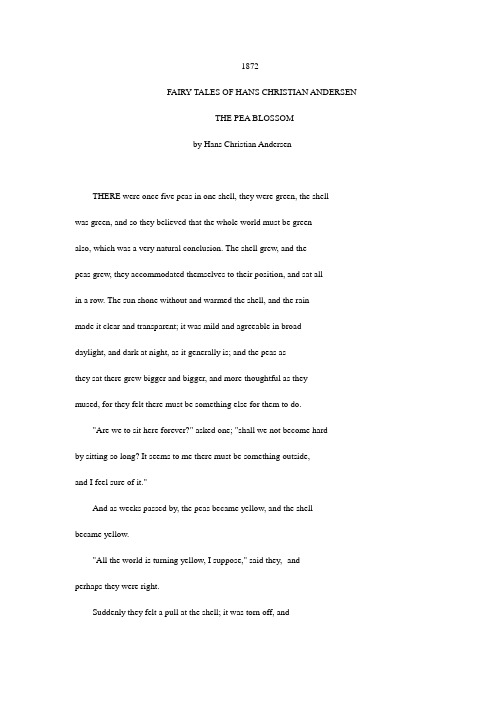
1872FAIRY TALES OF HANS CHRISTIAN ANDERSENTHE PEA BLOSSOMby Hans Christian AndersenTHERE were once five peas in one shell, they were green, the shellwas green, and so they believed that the whole world must be greenalso, which was a very natural conclusion. The shell grew, and thepeas grew, they accommodated themselves to their position, and sat allin a row. The sun shone without and warmed the shell, and the rainmade it clear and transparent; it was mild and agreeable in broaddaylight, and dark at night, as it generally is; and the peas asthey sat there grew bigger and bigger, and more thoughtful as theymused, for they felt there must be something else for them to do."Are we to sit here forever?" asked one; "shall we not become hardby sitting so long? It seems to me there must be something outside,and I feel sure of it."And as weeks passed by, the peas became yellow, and the shellbecame yellow."All the world is turning yellow, I suppose," said they,- andperhaps they were right.Suddenly they felt a pull at the shell; it was torn off, andheld in human hands, then slipped into the pocket of a jacket in company with other full pods."Now we shall soon be opened," said one,- just what they all wanted."I should like to know which of us will travel furthest," said the smallest of the five; "we shall soon see now.""What is to happen will happen," said the largest pea."Crack" went the shell as it burst, and the five peas rolled out into the bright sunshine. There they lay in a child's hand. A littleboy was holding them tightly, and said they were fine peas for his pea-shooter. And immediately he put one in and shot it out."Now I am flying out into the wide world," said he; "catch me if you can;" and he was gone in a moment."I," said the second, "intend to fly straight to the sun, thatis a shell that lets itself be seen, and it will suit me exactly;" and away he went."We will go to sleep wherever we find ourselves," said the two next, "we shall still be rolling onwards;" and they did certainly fall on the floor, and roll about before they got into the pea-shooter; but they were put in for all that. "We shall go farther than the others," said they."What is to happen will happen," exclaimed the last, as he wasshot out of the pea-shooter; and as he spoke he flew up against an old board under a garret-window, and fell into a little crevice, which was almost filled up with moss and soft earth. The moss closed itself round him, and there he lay, a captive indeed, but not unnoticed by God."What is to happen will happen," said he to himself.Within the little garret lived a poor woman, who went out to clean stoves, chop wood into small pieces and perform such-like hard work, for she was strong and industrious. Y et she remained always poor,and at home in the garret lay her only daughter, not quite grown up, and very delicate and weak. For a whole year she had kept her bed, and it seemed as if she could neither live nor die."She is going to her little sister," said the woman; "I had butthe two children, and it was not an easy thing to support both of them; but the good God helped me in my work, and took one of them to Himself and provided for her. Now I would gladly keep the other that was left to me, but I suppose they are not to be separated, and mysick girl will very soon go to her sister above." But the sick girlstill remained where she was, quietly and patiently she lay all theday long, while her mother was away from home at her work.Spring came, and one morning early the sun shone brightly through the little window, and threw its rays over the floor of theroom. just as the mother was going to her work, the sick girl fixedher gaze on the lowest pane of the window- "Mother," she exclaimed, "what can that little green thing be that peeps in at the window? Itis moving in the wind."The mother stepped to the window and half opened it. "Oh!" she said, there is actually a little pea which has taken root and isputting out its green leaves. How could it have got into this crack? Well now, here is a little garden for you to amuse yourself with."So the bed of the sick girl was drawn nearer to the window, that she might see the budding plant; and the mother went out to her work."Mother, I believe I shall get well," said the sick child in the evening, "the sun has shone in here so brightly and warmly to-day, and the little pea is thriving so well: I shall get on better, too, and goout into the warm sunshine again.""God grant it!" said the mother, but she did not believe itwould be so. But she propped up with the little stick the greenplant which had given her child such pleasant hopes of life, so thatit might not be broken by the winds; she tied the piece of string tothe window-sill and to the upper part of the frame, so that thepea-tendrils might twine round it when it shot up. And it did shoot up, indeed it might almost be seen to grow from day to day."Now really here is a flower coming," said the old woman onemorning, and now at last she began to encourage the hope that her sick daughter might really recover. She remembered that for some time the child had spoken more cheerfully, and during the last few days had raised herself in bed in the morning to look with sparkling eyes ather little garden which contained only a single pea-plant. A week after, the invalid sat up for the first time a whole hour, feelingquite happy by the open window in the warm sunshine, while outside grew the little plant, and on it a pink pea-blossom in full bloom. The little maiden bent down and gently kissed the delicate leaves. Thisday was to her like a festival."Our heavenly Father Himself has planted that pea, and made it grow and flourish, to bring joy to you and hope to me, my blessed child," said the happy mother, and she smiled at the flower, as ifit had been an angel from God.But what became of the other peas? Why the one who flew out into the wide world, and said, "Catch me if you can," fell into a gutteron the roof of a house, and ended his travels in the crop of apigeon. The two lazy ones were carried quite as far, for they alsowere eaten by pigeons, so they were at least of some use; but the fourth, who wanted to reach the sun, fell into a sink and lay therein the dirty water for days and weeks, till he had swelled to a great size."I am getting beautifully fat," said the pea, "I expect I shallburst at last; no pea could do more that that, I think; I am themost remarkable of all the five which were in the shell." And the sink confirmed the opinion.But the young maiden stood at the open garret window, with sparkling eyes and the rosy hue of health on her cheeks, she folded her thin hands over the pea-blossom, and thanked God for what He had done."I," said the sink, "shall stand up for my pea."THE END.。
